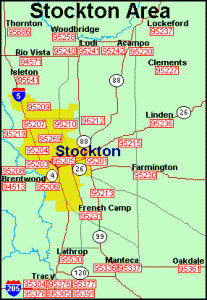Municipal Bankruptcy Stalks Stockton
By WAYNE LUSVARDI
Stockton, California’s 13th largest city, may be moving from “Fat City” to “Mudville.” Both were former historical names for Stockton. “BK” is shorthand for bankruptcy.
On Feb. 23, Stockton City Manager Robert Deis asked the city council to suspend municipal bond payments, possibly on as much as $341 million of bonds. If the City Council concurs with the recommendation, this will start a process under California’s new municipal bankruptcy law, AB 506. This new law requires a confidential neutral evaluation of bankruptcy and alternative dispute resolution methods to delay and prevent bankruptcy.
Bond Rating Downgrade
Following the city manager’s announcement on Feb. 24, Moody’s Investor’s Service downgraded Stockton’s bonds as shown below:
Stockton Bond Downgrade
| Type Bond | FROM | TO
|
Description |
| Issuer Rating | Ba2 | Baa1 | Speculative, high credit risk |
| Pension Bonds and Lease Bonds | Ba3 | B1 | Speculative, high credit risk |
| Water Enterprise Bonds | A3 | Aa3 | Medium grade, low credit risk |
| Moody’s Long-Term Rating Definitions: http://www.rbcpa.com/Moody%27s_ratings_and_definitions.pdf |
|||
Moody’s defines a B bond rating as a 35 percent chance of loss over a 20-year period.
The average person on the street probably wouldn’t understand a bond downgrade from Ba3 to B1. But they probably would understand that their home value might drop below even what was being considered “the bottom.”
Home Price Could Fall Below ‘Bottom’
In April 2011, local real estate investor Cary Fopiano was quoted in USA Today: “Home prices are about as low as they can go” in Stockton. Who could have guessed that, after Stockton home values fell an unbelievable 65 percent since 2006, they could be prone to fall further due to the possibility of bankruptcy?
The Zillow.com online home value tracking service indicates Stockton’s home value index dropped from about $335,000 in 2007 to $119,700 in December 2011. Home values have dropped about one third over all of California. But they have dropped by two thirds in Stockton.
Stockton Home Price Index Drop — Zillow.com
| January 2007 | December 2011 | Percent Change |
| $335,000 | $119,700 | Minus 65 percent |
If the Stockton City Council moves to file a bankruptcy action after the completion of the neutral bankruptcy study, then real estate brokers will have to start disclosing to prospective home buyers that the city was broke and could default on its bonds.
On October 21, 2011, the Wall Street Journal reported that Stockton was also struggling to continue to make payments on $87 million of redevelopment bonds issued in 2006.
Stockton had a reported operating budget deficit of $37 million, reflecting about 20 percent of its entire budget. Police and fire department salaries were reported to be 82 percent of its budget.
But Stockton was once “Fat City” from the 1990’s to about 2006.
From ‘Mudville’ to ‘Fat City’
Stockton’s extensive network of surrounding waterways might have been the reason it was dubbed the name “Mudville” at one time. But beginning in the 1990’s, it began downtown revitalization using redevelopment to buy and assemble land for public projects and re-zoning land for new housing projects.
The list of revitalization projects includes: Bob Hope Theater, Regal City Theatre Cinemas and IMAX, San Joaquin RTD Downtown Transit Center, Lexington Plaza Waterfront Hotel, Hotel Stockton, Stockton Arena, San Joaquin County Administration Building and Court House, Stockton minor league ballpark, Dean DeCarli Waterfront Square and Downtown Marina. As late as 2009, the city was considering the South Shore Housing Project, revamping the Robert J. Cabral Train Station neighborhood, erecting bridges across the Stockton Deep Water Channel and a new San Joaquin County Courthouse.
But those were the “fat years.” Now Moody’s Analytics predicts home prices in the Stockton area won’t recover for another 20 years. From “Fat City” back to “Mudville.”
‘No Joy in Mudville’
The Cultural Dictionary online defines the term “No Joy in Mudville” as a line from “Casey at the Bat,” a poem describing the reaction of the hometown crowd when their hero, Casey, struck out, losing the big game. Stockton has been the biggest loser thus far at the game of public-sector real estate development in California.
Related Articles
Pension Debt Vastly Understated
OCT. 20, 2010 By DAVE ROBERTS The Governmental Accounting Standards Board (GASB) is considering changing the rules for government pension
Jerry Brown's Game of Chicken
DEC. 20, 2010 We’re about to witness a new twist on Sacramento’s annual high-stakes budget game. Many Capitol observers believe
How Not To Fix A Broken State
OCT. 19, 2010 This book review was first published in City Journal. By STEVEN GREENHUT California Crackup: How Reform Broke



